50 products
50 products
Sort by:
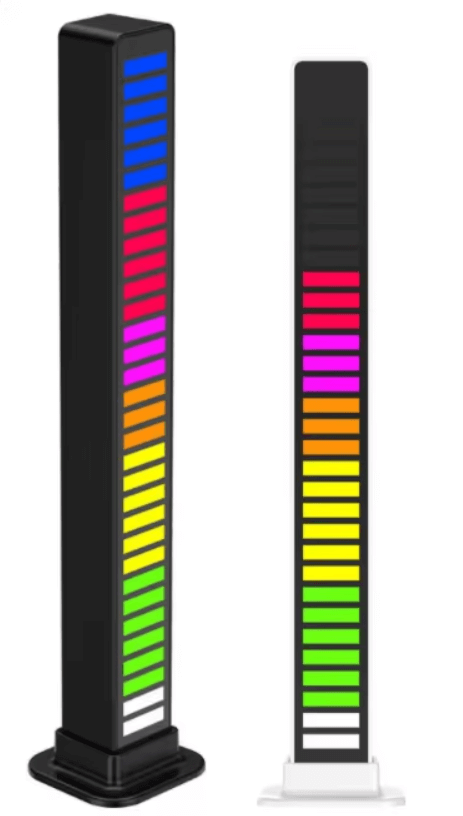
Sound Activated LED Light Bar
$8.99 USD
Unit price perSound Activated LED Light Bar
$8.99 USD
Unit price perTransform any room into an ambient zone with this LED Light Bar. With 32 colorful lamp beads and 18 adjustable color modes, create the perfect atmosphere for any occasion. Control the lights with your voice, adjust brightness and speed, and enjoy 8 display modes. Easy to use and perfect for any space.
-
Includes: 1 RGB pickup light, 1 Type-C data charging cable, 1 light base, 4 pieces of double-sided tape, and an instruction manual
- Adjustable microphone sensitivity
- Watch TV, play music, play e-sports games, and car music to accompany the light rhythm
Benefits
- Teaches cause and effect
- Helps develop pattern recognition
Specs for LED Light Bar
Dimensions
11" tall
Material
ABS Plastic and electronic components
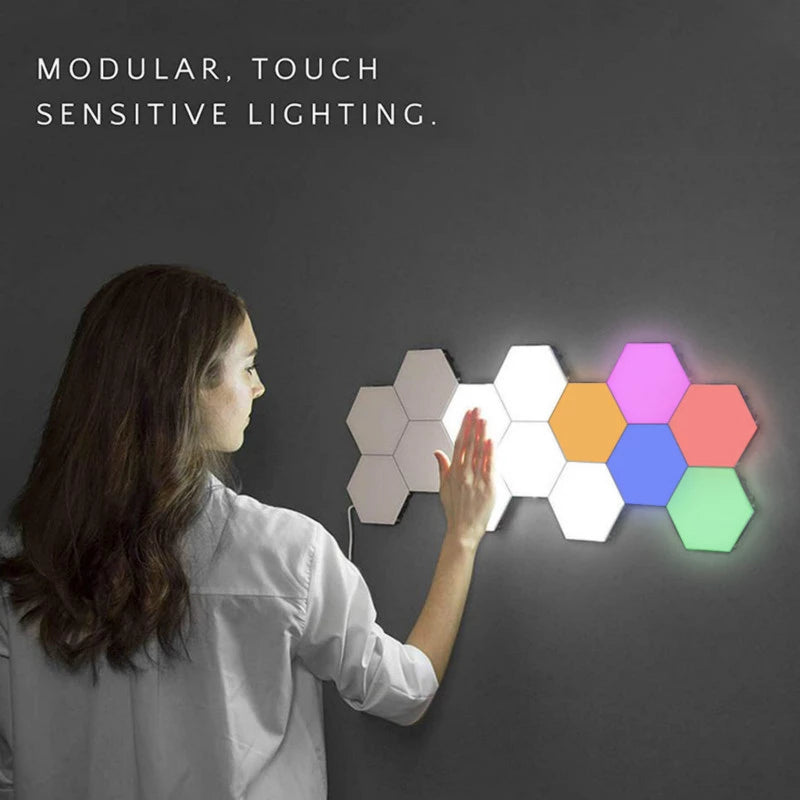
Touch Control Hexagon LED Light - 6 pk
$69.49 USD
Unit price perTouch Control Hexagon LED Light - 6 pk
$69.49 USD
Unit price perHexagon LED Lights are modular, touch lamps that can be formed in a variety of shapes.
Let your imagination shine with this 6-pack of hexagon LED lights. Completely modular, they fit snugly together to make a modern masterpiece. Interaction is easy – just touch the light to turn it on or off. Perfect for the office, bedroom, classroom, or anywhere you want to make a fun and interactive statement.
- Comes with 6 lights, USB cord, and wall tape
- 5 colors: red, blue, orange, purple, and green
- Voltage: 110-240V
Benefits
- Help with cause and effect understanding, problem solving, spatial reasoning
- Encourages creative use of lights
- Helps improve mood and focus
- Excellent for crossing the midline in play and therapy
Need Fulfilled
- Visual input
- Hand eye coordination
- Color recognition
Specs for LED Lights
6 individual lights; remote; 120v plug, adhesive for the wall.
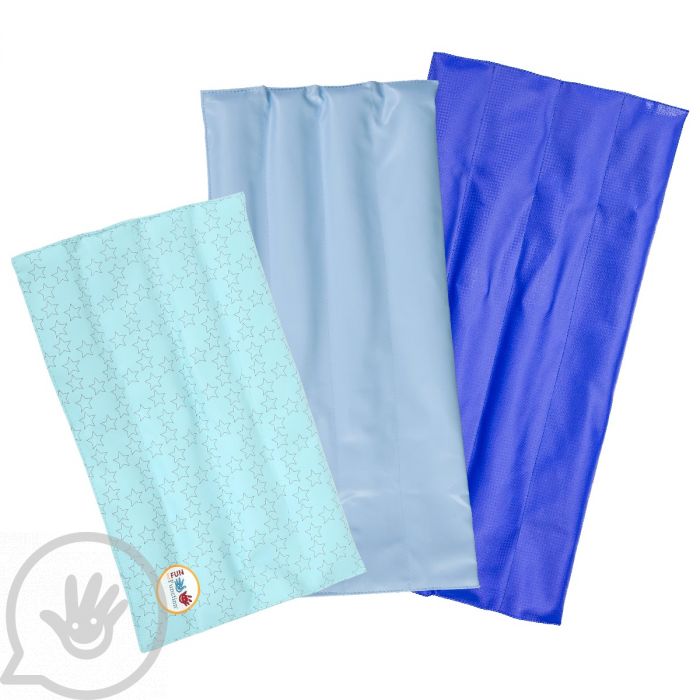
Wipe Clean Weighted Lap Pads
From $45.99 USD
Unit price perWipe Clean Weighted Lap Pads
From $45.99 USD
Unit price perWipe Clean Weighted Lap Pads help put the wiggles and anxiety to rest. The deep pressure soothes and serves as a gentle reminder to stay in place and focus. Place on lap while seated, or across the back when lying down. Just wipe down to clean, making this suitable for use by multiple children, in community settings or during mealtime. Excellent for teens and college students, along with a tool for the office.
- For use with adult supervision
- Ages 3+
Benefits
- Helps increase mood and focus
- Eases transition and travel
- Perfect for use in the classroom
Need Fulfilled
- Proprioceptive input
Safety Features
- Tested at an independent and accredited third-party lab
- Meets or exceeds government safety standards for lead, physical and mechanical hazards (and stuffing cleanliness)
- Seam strength is also tested to help ensure the long-term durability for our most active users.
Specs for Lap Pads
Material
100% polyurethane
Weights are 1.4mm steel pellets in separate 100% polyester lining
Sizing
Small, 3 lb pad: For children weighing 30+ lbs. 13" x 8".
Medium, 5 lb pad: For children weighing 50+ lbs. 18" x 9".
Large, 7.5 lb pad: For children to adults weighing 75+ lbs. 23" x11 ".
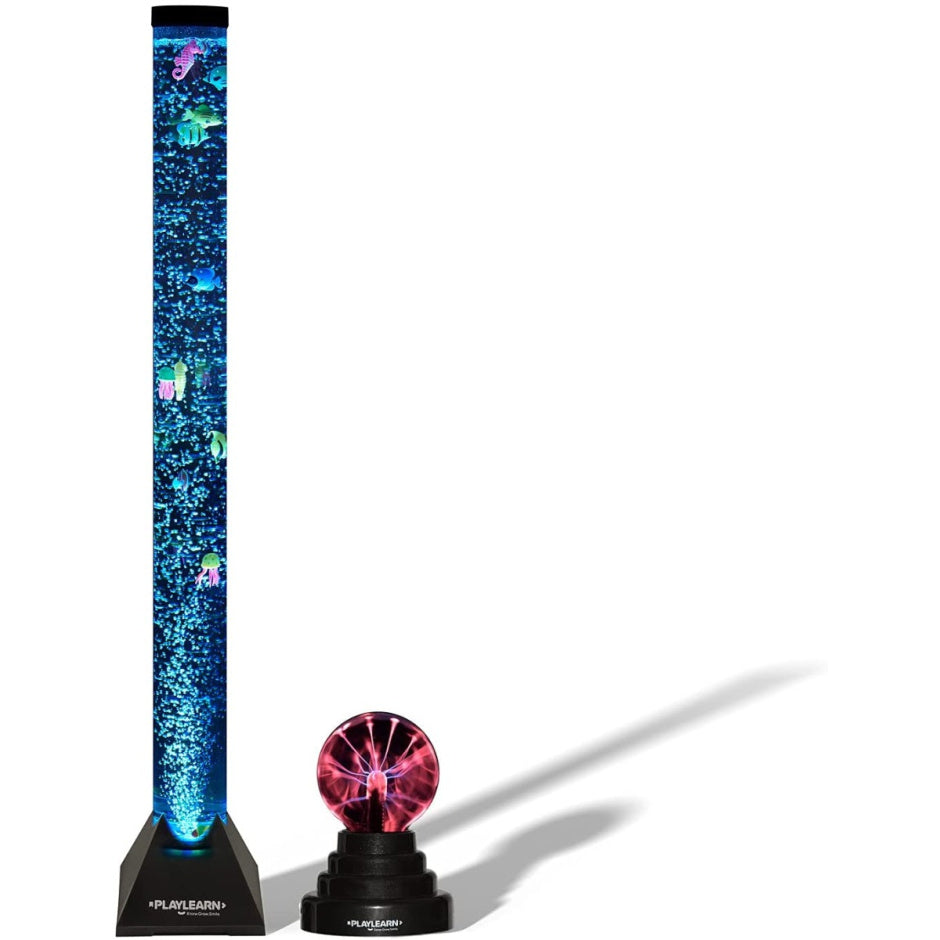
Combo Pack - 4-ft Aquarium Bubble Tube & 3" Plasma Ball
$161.99 USD
Unit price perCombo Pack - 4-ft Aquarium Bubble Tube & 3" Plasma Ball
$161.99 USD
Unit price perThe Combo Pack includes a 4-ft Aquarium Bubble Tube and a 3-in Plasma Ball. The Bubble Tube’s combination of color changing bubbles, moving fish, and gentle hum make this bubble lamp the ideal sensory product that stimulates the senses and creates a calming and relaxing atmosphere. The 3-in glass Plasma Ball is a sound and touch-sensitive visual and tactile experience.
- Bubble tube holds 2 gallons of distilled water
- The 4-ft Aquarium Bubble Tube and 3-in Plasma Ball fit seamlessly into various room sizes
- Vibrant LED lights in the bubble tube and multi-colored electric beams in the plasma ball create a visually captivating experience
- Sturdy construction ensures long-lasting enjoyment and reliability
- Ideal for creating a calming atmosphere with the bubble tube and adding excitement to events with the plasma ball
- Aesthetically pleasing design enhances the ambiance of any room or event
- Both products are designed with safety in mind, making them suitable for children to enjoy
- The combination of visual effects and touch-sensitive interaction enhances sensory stimulation
-
Easy to assemble and operate, providing convenience for users of all ages
- Plasma Balls recommended for ages 14+
Benefits
- Interactive sensory experience that soothes and relaxes
- Encourage visual development and tracking
Need Fulfilled
- Visual and tactile input
Specs for Combo Pack
Dimensions for Bubble Tube
48" x 4"
Power Source for Tube and Ball
Plug-in
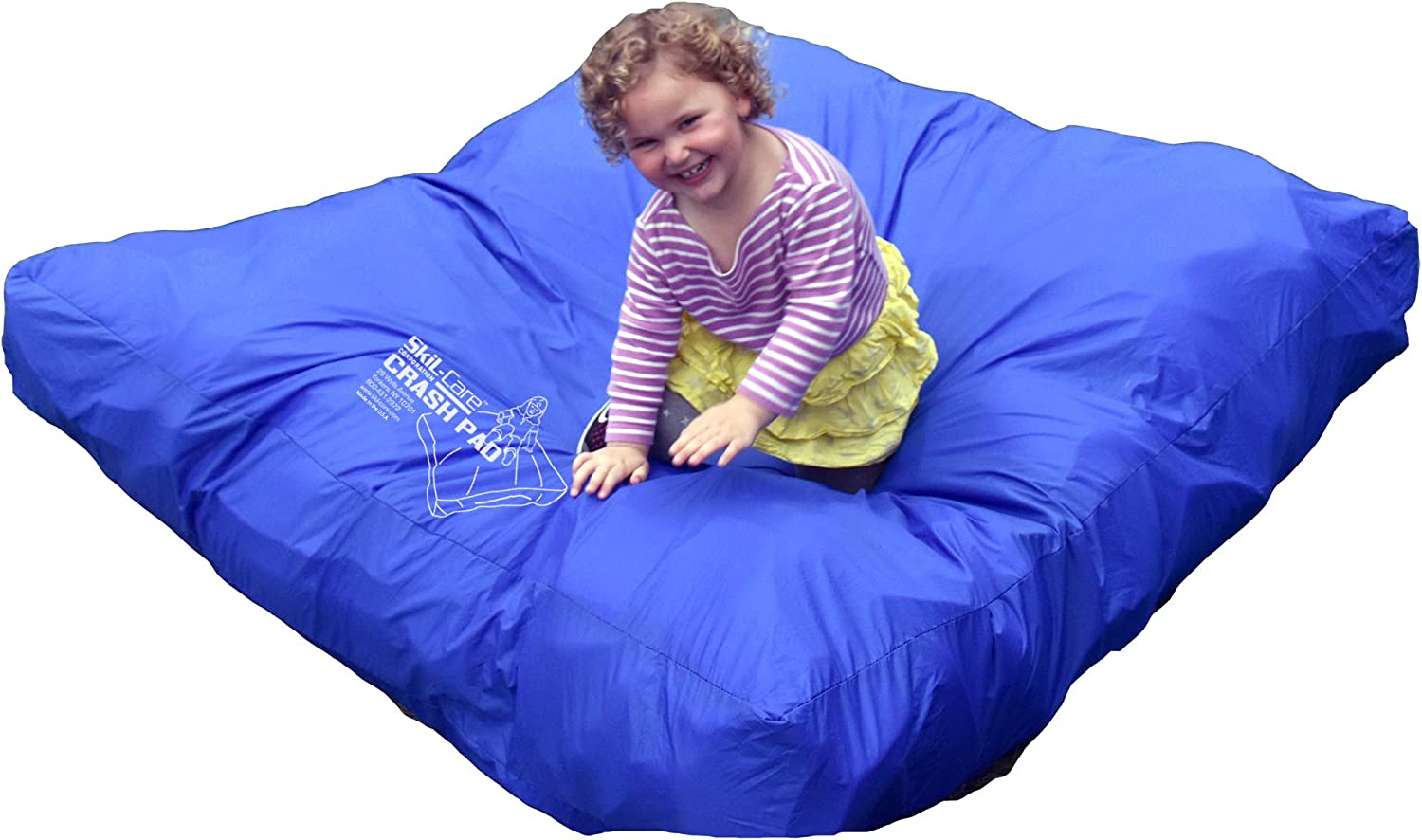
Crash Pads
From $239.99 USD
Unit price perCrash Pads
From $239.99 USD
Unit price perThe Crash Pad was developed primarily for young adults to serve as a fall pad whether for exercises or learning appropriate responses to falling. In many situations, children with a developmental delay or sensory integration disorder need to learn the appropriate falling procedures. This crash pad is great for sensory stimulation activities, balance activities, or just a great place to crash!
Get out that restless energy!
Ideal for sensory rooms in schools, clinics or at home!
- Comes with removable vinyl cover, easily wipeable for cleaning
- Sturdy construction with rip-stop nylon
- Do not use this crash pad within 5 feet of a wall
- Since jumping, flipping or bouncing involves some risk, it is mandatory that these Crash Pads be used with a trained professional in attendance
- Comes in two sizes 4' L X 3' W or 5' X 5'
- Add an extra nylon cover or make it extra cozy with the Cozy Cloth Cover
This item is shipped directly from the manufacturers warehouse.
This item is non-returnable.
Benefits
- Helps improve gross motor skills including balance and coordination
- Helps organize sensory information
- Gives great proprioceptive input
Needs Fulfilled
- Vestibular and proprioceptive input
Specs for Crash Pads
Material
Nylon and high-density polyurethane foam
Ships compressed and will expand to complete fullness within 48 hours.
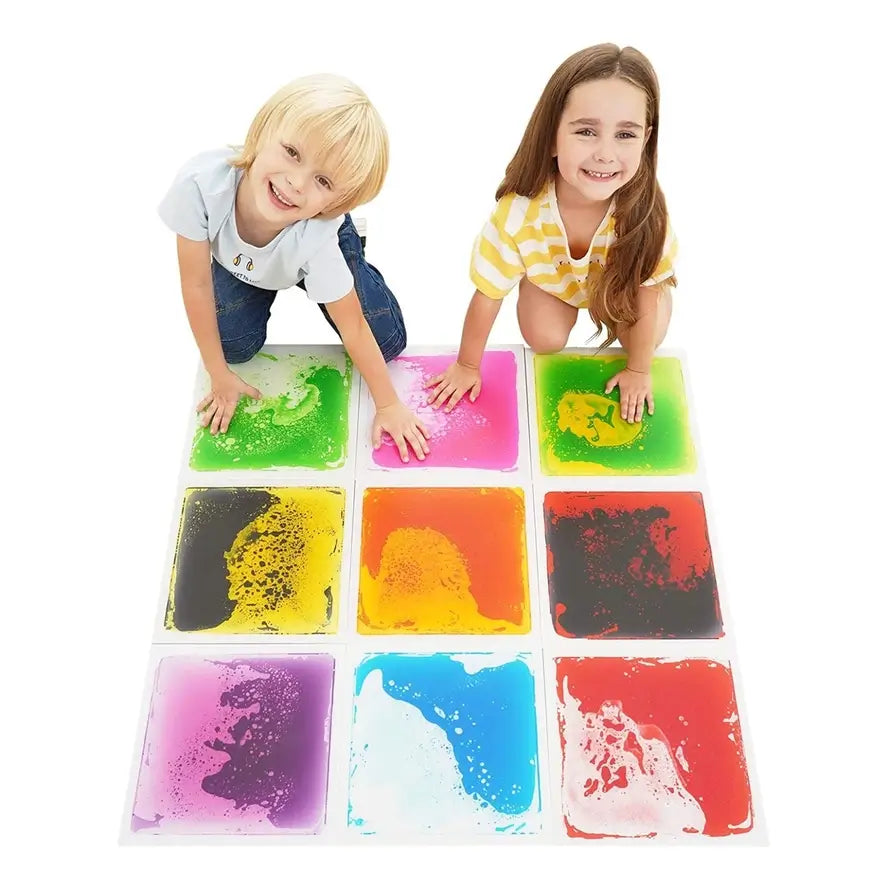
Special Supplies Square Liquid Floor Tiles - Individual 12x12"
$19.99 USD
Unit price perSpecial Supplies Square Liquid Floor Tiles - Individual 12x12"
$19.99 USD
Unit price perStep into a world of fun and learning with these amazing Liquid Floor Tiles. These durable, leak-resistant tiles are perfect for games, dancing, and hopping thanks to their non-slip backing that keeps them securely in place. These vibrant tiles change colors with every step, press, or hop, providing a genuine sensory experience that kids of all ages will love. Filled with non-toxic liquid, these tiles offer endless colorful fun. The mesmerizing "lava" motion inside the tiles adds an extra element of fun and creativity to playtime. Whether at home or in the classroom, these hassle-free floor activity mat tiles are a safe and visually stimulating option for teaching colors, guiding kids to specific spots, or simply having fun with friends.
- Tear resistant
- Ideal for home or the classroom
- Easy to clean
- Holds up to 265 lbs
Benefits
- Encourages gross motor and fine motor development
- Helps develop visual tracking skills
- Encourages sensory integration
- Helps improve mood and focus
- Supports transitions
Need Fulfilled
- Visual, tactile and proprioceptive input
Specs for Liquid Floor Tiles
Materials
Thermoplastic elastomer (TPE) and PVC
Thickness
.2"

Textured Liquid Floor Tiles
$24.99 USD
Unit price perTextured Liquid Floor Tiles
$24.99 USD
Unit price perPlay time and early learning has never been more fun than with colorful and interactive textured liquid floor tiles! We all want our kids and students to be more active in their everyday lives, especially when it comes to physical activity. That's why these super fun and super colorful Textured Square Liquid Floor Tiles were developed: to turn a bedroom, classroom, or play area into a place of unimaginable fun!
These non-slip, leak-resistant liquid tiles are designed to let children hop, dance, play games, and jump around creating colorful designs and patterns that move with them. And because they help children relax and have fun they're great for those who need extra sensory stimulation or to help parents and teachers keep kids more focused when it matters most.
- Non-toxic
- Hold up to 264 lbs
Benefits
- Encourages gross motor and fine motor development
- Helps develop visual tracking skills
- Encourages sensory integration
- Helps improve mood and focus
- Supports transitions
Need Fulfilled
- Visual, tactile and proprioceptive input
Specs for Tiles
Dimensions
12 x 12 x 0.1 inches
Material
PVC
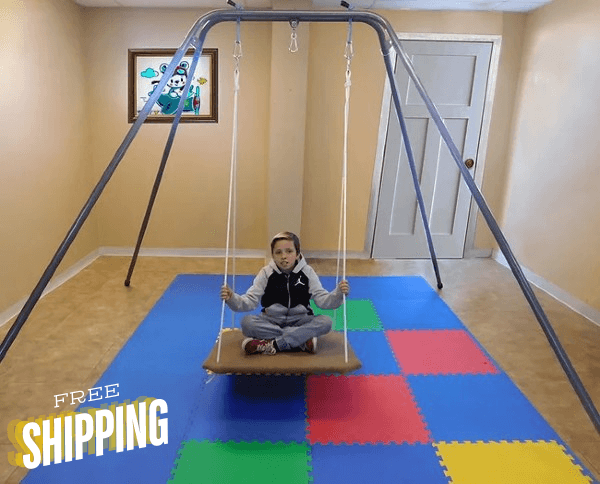
HPSI Portable Swing Frame with Swivel
$1,585.00 USD
Unit price perHPSI Portable Swing Frame with Swivel
$1,585.00 USD
Unit price perThe HPSI Portable Swing Frame is specifically designed with schools and institutions in mind to provide the strongest and longest-lasting swing experience possible.
- Includes all necessary hardware for immediate use
- Smooth 360-degree rotation center swivel (ball bearing) for spinning
- Indoor/Outdoor powder coat (plastic) finish*
- Rubber tipped feet
- No cross bars to trip over
- Easy to assemble and transport from room to room
- This listing is for the stand only
- Holds up to 325 lbs
This item is shipped directly from the manufacturer. Shipping costs are included in the price.
Need Fulfilled
- Vestibular input
Specs for Portable Swing Frame
Footprint
7'4" height 8'6" X 8'6"
Frame Weight
56 lbs
*Indoor/Outdoor use should be for a limited time and brought in when not in use. Weather can rust bolts over time making portability difficult.
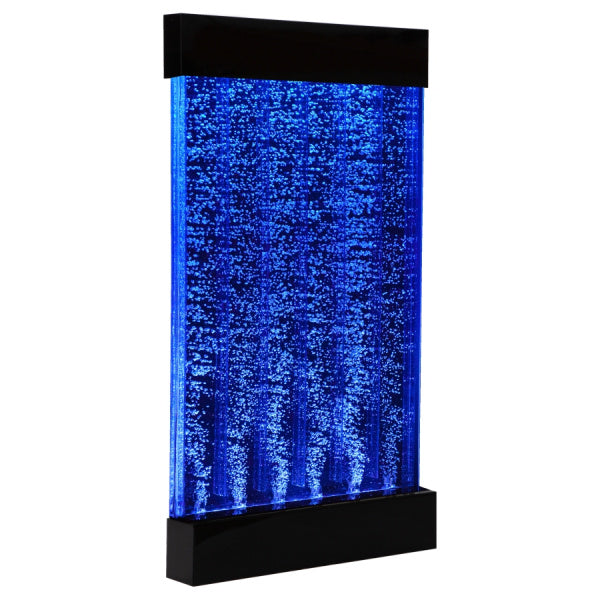
3 ft Bubble Wall with Color Changing LED Lights - Wall Mounted
$449.99 USD
Unit price per3 ft Bubble Wall with Color Changing LED Lights - Wall Mounted
$449.99 USD
Unit price perThis wall-mounted 3-ft Bubble Wall with Color Changing LED Lights enhances the ambiance of sensory rooms, bedrooms, or play spaces, creating a peaceful and calming environment. Its gentle bubbles and shifting colors stimulate visual and auditory senses, supporting children’s sensory development. Designed to encourage relaxation and emotional regulation, it promotes a calm state of mind while enhancing mood. A thoughtful addition to any sensory-friendly space, it invites moments of tranquility and exploration.
- Holds 2 gallons of water
- Wall mounted
- Comes with remote control and power adaptor
- Easy set up
- Relaxing hum while on
- Fits into sensory rooms, schools, restaurants, offices, waiting rooms, and nursing homes
- 21.6 watts
- Bubble Wall Manual
Benefits
- Promotes color recognition
- Visual stimulation with bubbles and color change creates relaxation and increases ability to focus and regulate mood
-
Touching the wall creates a tactile sensory experience
Need Fulfillment
- Visual input
Specs for Bubble Wall
Material
Acrylic top and base
Dimensions
35-in x 20-in x 2in
Weight
25 lbs.
Water Volume
2 gallons

Playlearn 6 ft Blackout Sensory Tent
$242.99 USD
Unit price perPlaylearn 6 ft Blackout Sensory Tent
$242.99 USD
Unit price perThe 6 ft Blackout Sensory Tent provides a safe and non-stimulating environment for children to calm down and refocus. Ideal for exploring accessories that light up or glow in the dark, it is also fantastic for projected images as it allows users to get close to or touch the color and movement. Create your own mini sensory room!
- Content includes: 28 poles, 8 corner connectors, 16 straight connectors, 1 fabric cover
- Easy set up and storage
- Light-weight, durable, and easy to transport
- Age 3+
Benefits
- Helps kids with the process of self-regulation
- Helps kids refocus and calm down
- Provides an opportunity to explore sensory input
Need Fulfillment
- Visual and Auditory input
Specs for Blackout Tent
Material
Plastic
Dimensions
47 x 47 x 70 in
Weight
11.73 lbs
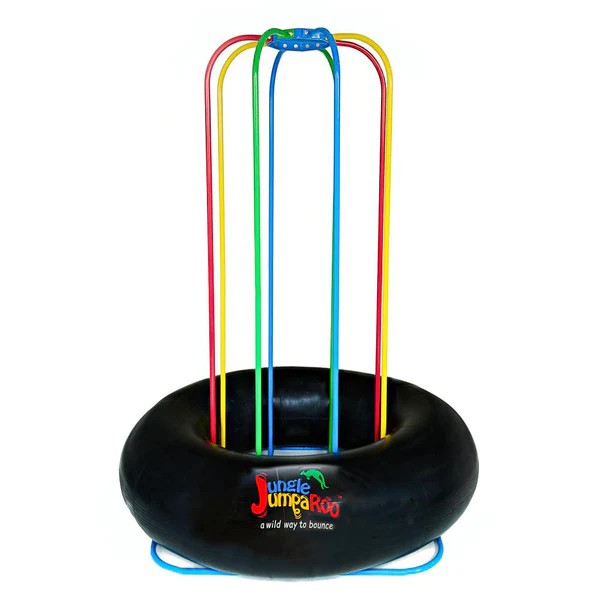
Jungle Jumparoo
$499.99 USD
Unit price perJungle Jumparoo
$499.99 USD
Unit price perExperience the wildest way to exercise with the one-of-a-kind Jungle Jumparoo!
Jungle Jumparoo is an indoor/outdoor bounce and jump sensory tool that is designed to provide both proprioceptive and vestibular input while having a blast! All age groups can enjoy this high-quality, safe Jumparoo and get those sensory juices flowing. So go ahead and climb, swing, and jump!
Featuring vertical bars that provide safety and security while jumping, it is low to the ground for easy on and off, and there is NO double bounce which allows small children to jump with anyone safely. The Jungle Jumparoo provides a safe and healthy way for your children to get the exercise they need, without compromising the fun or enjoyment they experience.
Ten minutes playing on the Jungle Jumparoo is equivalent to your child running for 33 minutes, and it's the exercise they'll be excited to do. The activities and games are endless!
The 6 1/2' Jungle Jumparoo is designed for ages 2 years & up. It is indoor/outdoor use and is perfect for backyards, indoor playrooms, pre-schools, daycare centers and playgrounds. The Jungle Jumparoo is made of high-quality steel and glazed with powder coated paint.
-
When using the Jungle Jumparoo outdoors, keep the Jungle Jumparoo out of direct sunlight as the extreme heat and UV will limit the lifespan of the inner tube. The Jungle Jumparoo should be placed in the shade with the Tube Cover and All-Weather Cover in use.
- Weight: 95 lbs
-
Box Dimensions: 46" x 24" x 6"
- Assembly instructions
This item is not available in store and is shipped directly from the manufacturer.

6 ft Aquarium Bubble Tube - One Piece with Secure Mount
$699.99 USD
Unit price per6 ft Aquarium Bubble Tube - One Piece with Secure Mount
$699.99 USD
Unit price perThe 6ft One Piece Secure Mount Aquarium Bubble Tube offers a calming sensory experience, perfect for children’s relaxation and development. The gentle bubbles and soft lighting help create a peaceful environment, reducing stress and promoting focus. It’s a great tool for enhancing sensory skills while adding a soothing, aquarium-like charm to any space. Ideal for sensory rooms, therapy settings, or bedrooms, this bubble tube provides both therapeutic benefits and a touch of tranquility to any room.
- Holds 6.5 gallons of distilled water
- Comes with a remote control
- Standard Plug (AC12V 800mA)
- Choose from 20 vibrant color settings for a personalized ambiance
- Stainless steel safety base ensures stability and longevity
- Enhances room décor with its multifunctional design
- Secure base and optional bracket to ensure safety during use
- LED lights and moving fish captivate and soothe
-
Conveniently customize settings with the Playlearn App or include remote
- Bubble Tube User Manual
Benefits
- Promotes color recognition
- Visual stimulation with bubbles and color change creates relaxation and increases ability to focus and regulate mood
- Touching the tube creates a tactile sensory experience
Need Fulfillment
- Visual input
Safety Features
- The base is designed with safety in mind to keep the tube secure
Specs for Bubble Tube
- 71"H x 8"W x 8"L x 6"D
- Weight: 8.5lbs
- Water Volume: 6.5 gallons
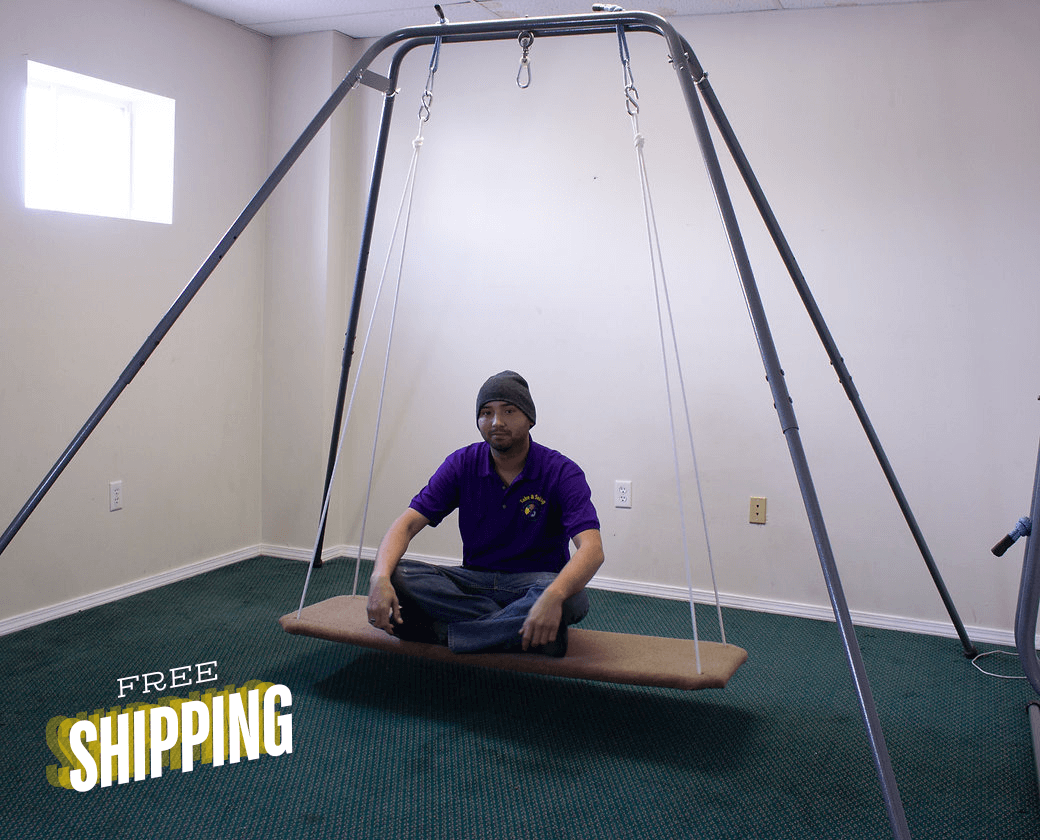
Adult Carpeted Platform Swing Seat
$439.99 USD
Unit price perAdult Carpeted Platform Swing Seat
$439.99 USD
Unit price perCarpeted Platform Swing Seat is a strong, versatile swing seat for all!
A light yet strong platform swing which can easily hold you, your child, and some friends.
With the stationary eye hooks it is a neat place for a child to read, do school work, or various therapies.
You can sit, kneel, stand, crouch on the Plywood Platform or invite some friends and have a swinging party.
- Seat only
- Excellent for home, therapy offices, commercial setting, schools and more
- Add a swivel for multidirectional swinging - must order separately
- Platform large enough for multiple people
- Holds up to 450 lbs.
- Made in USA
This item is shipped directly from the manufacturer. Domestic shipping included.
Benefits
- Helps develop gross motor skills, sense of balance, coordination, and spatial awareness
- Improves mood and focus
- Strengthens core and improves body awareness and posture
Need Fulfilled
- Vestibular input
Specs for Swing Seat
Dimensions of seat
60” x 20” x 3/4”


Bracket for 2.7ft and 4ft Bubble Tubes
$16.95 USD
Unit price perBracket for 2.7ft and 4ft Bubble Tubes
$16.95 USD
Unit price perKeep your bubble tube safe and secure with this practical bracket, designed to protect it from gentle knocks and accidental spills. While not built to withstand strong pulls, it's perfect for ensuring stability during sensory play. Easy to install with just 3 screws, this bracket offers peace of mind, helping prevent accidents in sensory rooms or play areas. Remember, it should be professionally installed with the right screws and plugs for your wall type to ensure safety.
Suitable for:
-
2.7ft Starter Bubble Tube Aquarium
-
4ft One Piece Secure Mount Aquarium Bubble Tube
More info:
-
Adjustable design, extends from 5 to 8.5 inches, ensuring a customized fit for your Bubble Tube
-
Sleek and stylish black finish, complementing various room aesthetics seamlessly
-
Crafted from durable materials, providing long-lasting support and reliability
-
Securely mount your Bubble Tube onto the wall, reducing the risk of accidents and spills during playtime
-
Enhances the appearance of your Bubble Tube setup, creating a visually appealing focal point in any room
-
Ensures a stable and safe environment for children to interact with the Bubble Tube without concerns about instability
-
Simple installation process, making it accessible for parents and caregivers to set up
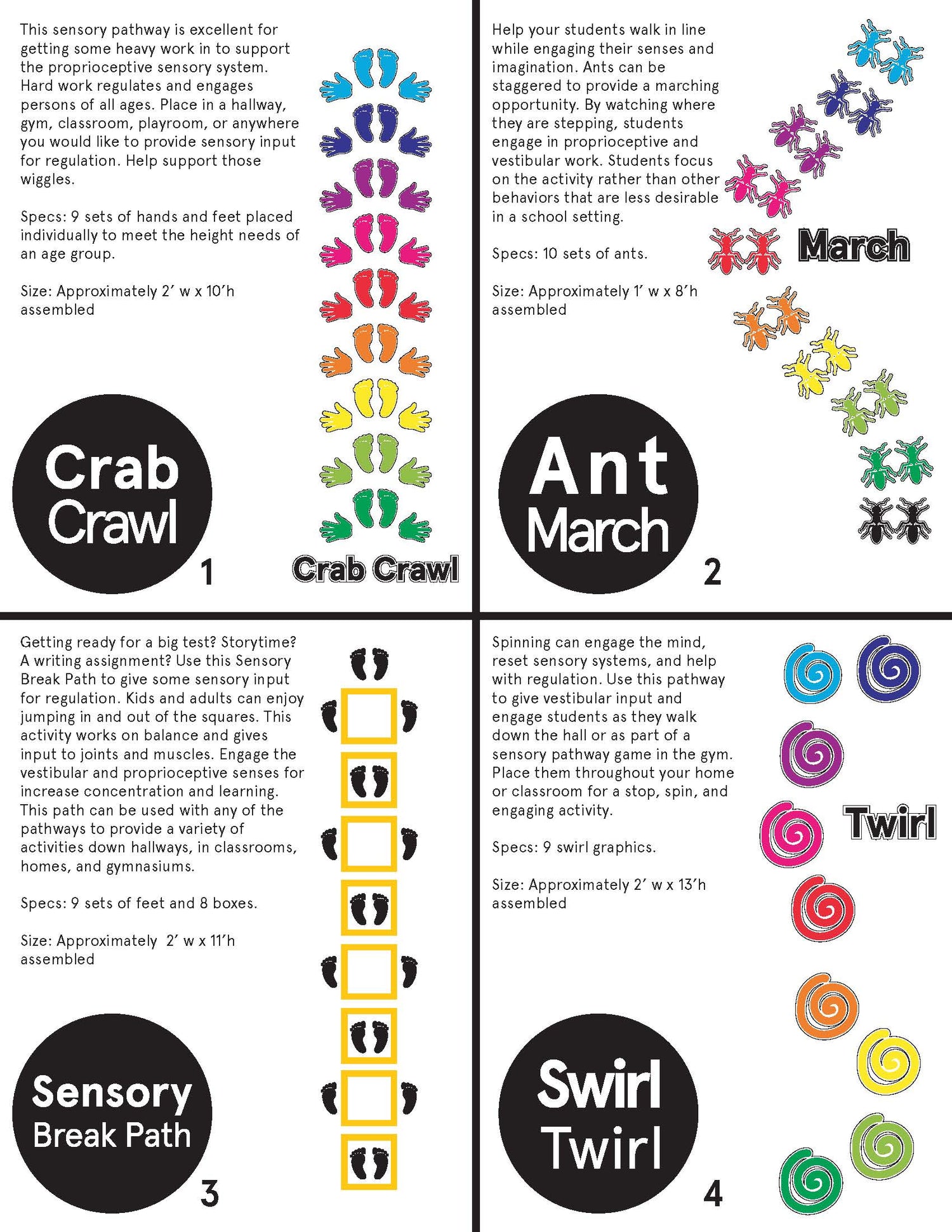
Sensory Pathways
From $49.99 USD
Unit price perSensory Pathways
From $49.99 USD
Unit price perSensory Pathways and Walls are excellent for engaging children of all ages. Even adults love to engage in play and support their senses. These pathways are custom made, durable and able to stand the test of time.
- Tear-resistant
- Non-slip laminate available
- Scuff-resistant
- Easy to apply
Pathways and sensory walls are excellent additions to schools, daycares, gyms, and homes. Brighten up your halls in pediatric offices, doctor offices, therapy, dental and more.
Sensory paths and walls can ease anxiety, distract from worry, provide heavy work, and fun when it might otherwise be a stressful situation. By giving an opportunity for sensory regulation, processing the environment can become easier and less dysregulated.
All paths and wall decals can be combined to provide an interactive and regulating activity. Kids have difficulty staying in line or keeping their hands to themselves; use sensory paths to engage the proprioceptive, vestibular, tactile, visual, and auditory senses. Give opportunity for sensory input to help mitigate maladaptive behaviors in the classroom.
Decals come with a standard gloss laminate (covering). Non-Slip laminate is available, please add 25%.
Prices are minimum for each set, please ask about our larger or custom sizes available!
Size height is the length; however, shapes can be spread apart as near or far for the specific space.
CRAB CRAW
This sensory pathway is excellent for getting some heavy work in to support the proprioceptive sensory system. Hard work regulates and engages persons of all ages. Place in a hallway, gym, classroom, playroom, or anywhere you would like to provide sensory input for regulation. Help support those wiggles.
Specs: 9 sets of hands and feet placed individually to meet the height needs of an age group.
Size: Approximately 2’ w x 10’h assembled
ANT MARCH
Help your students walk in line while engaging their senses and imagination. Ants can be staggered to provide a marching opportunity. By watching where they are stepping, students engage in proprioceptive and vestibular work. Students focus on the activity rather than other behaviors that are less desirable in a school setting.
Specs: 10 sets of ants.
Size: Approximately 1’ w x 8’h assembled
SENSORY PATHWAY
Getting ready for a big test? Storytime? A writing assignment? Use this Sensory Break Path to give some sensory input for regulation. Kids and adults can enjoy jumping in and out of the squares. This activity works on balance and gives input to joints and muscles. Engage the vestibular and proprioceptive senses for increase concentration and learning. This path can be used with any of the pathways to provide a variety of activities down hallways, in classrooms, homes, and gymnasiums.
Specs: 9 sets of feet and 8 boxes.
Size: Approximately 2’ w x 11’h assembled
TWIRL
Spinning can engage the mind, reset sensory systems, and help with regulation. Use this pathway to give vestibular input and engage students as they walk down the hall or as part of a sensory pathway game in the gym. Place them throughout your home or classroom for a stop, spin, and engaging activity.
Specs: 9 swirl graphics
Size: Approximately 2’ w x 13’h assembled
TIP TOE
Shhhhh, we need to be quiet in the hallway. How can we reinforce quiet walking with fun and sensory integration? Use the Tip Toe pathway! Students can tip toe their way through the halls while engaging their vestibular sensory system. Student focus on the pathway and balance, eliminating most disruptive behaviors. Use this pathway with others for sensory regulation.
Size: 4’ w x 12’h
WINDY PATH
Work on balance and concentration while winding down the hallway. Students will focus on the pathway to work on concentration and vestibular input. Make walking in line a game to mitigate disruption and include some fun.
Size: 4’ w x 13.5’h
HOPSCOTCH VINE
Jump your way to the flower as you learn numbers and counting. Working on your 2’s; hop on one side. Toss a bean bag to a number and hop your way there. There are many ways to use this colorful and interactive sensory path. Jump with two feet like skiing, side to side. These activities work on proprioceptive and vestibular input while learning.
Size: Approximately 2.5’ w x 8.5’h
HOPSCOTCH FOREST ANIMALS
Join your forest friends and climb the tree while working on your numbers and counting. Toss a bean bag to a number and hop your way to pick it up. Use two feet or one. Walk along the tree jumping from number to number. Tip toe so you don’t disturb the animals. These activities work on proprioceptive and vestibular input while learning.
Size: Approximately 4’ w x 15' h
WINDY PATH - BALANCE
Work on balance and concentration while winding down the hallway. Students will focus on the pathway to work on concentration and vestibular input. Make walking in line a game to mitigate disruption and include some fun.
Size: 4’ w x 13.5’h
ALPHABET HOPSCOTCH
This versatile alphabet can be put together for interactive hopscotch, follow the alphabet path, or spread throughout a room for a fun game of finding letters or spelling words. Get creative in your space for learning and sensory input.
Size: Approximately 2’ w x 7’h assembled
NUMBERED STEPS
Work on counting, adding, subtracting and more with these versatile numbers. Use them as a sensory pathway or add them to a sensory wall. Get creative and get kids moving quietly down a hall or quickly during a math game.
Size: Approximately 1.5’ w x 3.6’h assembled

Marlowe & Co. Desert Sage Double Layer Compression Sensory Swing
$91.99 USD
Unit price perMarlowe & Co. Desert Sage Double Layer Compression Sensory Swing
$91.99 USD
Unit price perThis signature double layer sensory swing is made from a soft high-quality blend of 95% Cotton + 5% Spandex that can hold up to 200 lbs. The double layers provide extra comfort and security and will not cause the swing to stretch to the ground.
How does it work? Vestibular swings promote coordination and balance, strengthen muscles, and improve motor skills. The compression of the swing helps your child feel secure similar to getting a hug promoting feelings of security and relaxation, while the swinging motion provides sensory input, endless possible positions, and indoor fun!
- Swings measure 35 in x 43 in when lying flat
- Ideal ceiling height for installation is 6-9 ft. A minimum of 6 ft from walls or objects is needed for safety and for the best swinging experience.
- Installs into wood or cement
- Includes: One fabric swing, one attached daisy chain strap, swivel hardware set, instructions, one cotton tote bag
- Tools needed to install are: stud finder, drill, drill bit, and a socket wrench
- Ages 3+
Benefits
- Compression from the swing gives a hug-like effect to your child
- Helps develop gross motor skills and a sense of balance
- Helps develop core muscles and hand/eye coordination
- Improves mood and focus
- Gentle Deep Touch Pressure input that helps organize sensory information
Need Fulfilled
- Vestibular, tactile, proprioceptive input
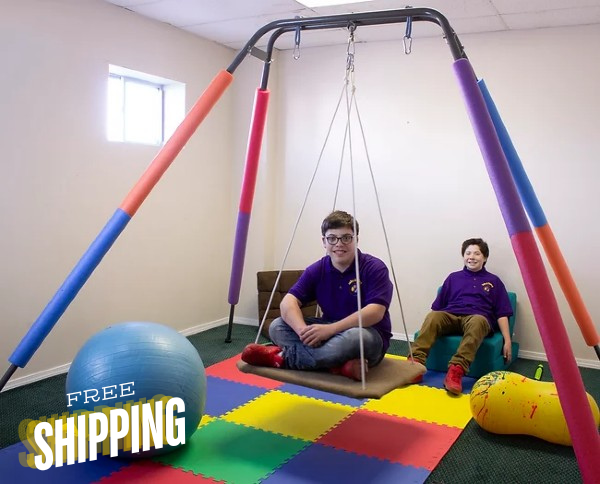
Carpeted Platform Jr. Swing
From $440.99 USD
Unit price perCarpeted Platform Jr. Swing
From $440.99 USD
Unit price perThe Carpeted Platform Jr. Swing Seat is a strong, versatile swing seat for all!
A light yet strong platform swing which can easily hold you, your child, and some friends.
With the optional Swivel, the Plywood Platform makes a fun and stimulating swing for swinging, spinning or gliding (swinging from side to side). With the stationary eye hooks it is a neat place for a child to read, do school work, or various therapies.
- Seat only
- Excellent for home, therapy offices, commercial setting, schools and more
- Add a swivel for multidirectional swinging
- Platform large enough for up to 2
- Holds up to 350 lbs
- Made in USA
Benefits
- Helps develop gross motor skills, sense of balance, coordination, and spatial awareness
- Improves mood and focus
- Strengthens core and improves body awareness and posture
Need Fulfilled
- Vestibular input
Specs for Swing Seat
Dimensions of seat
30” x 30” x 1/2”
Weight
15 lbs
This item is unavailable in store, but is shipped directly from the manufacturer. Domestic shipping included.

Marlowe & Co. Vintage Rose Double Layer Compression Sensory Swing
$91.99 USD
Unit price perMarlowe & Co. Vintage Rose Double Layer Compression Sensory Swing
$91.99 USD
Unit price perThis signature double layer sensory swing is made from a soft high-quality blend of 95% Cotton + 5% Spandex that can hold up to 200 lbs. The double layers provide extra comfort and security and will not cause the swing to stretch to the ground.
How does it work? Vestibular swings promote coordination and balance, strengthen muscles, and improve motor skills. The compression of the swing helps your child feel secure similar to getting a hug promoting feelings of security and relaxation, while the swinging motion provides sensory input, endless possible positions, and indoor fun!
- Swings measure 35 in x 43 in when lying flat
- Ideal ceiling height for installation is 6-9 ft. A minimum of 6 ft from walls or objects is needed for safety and for the best swinging experience.
- Installs into wood or cement
- Includes: One fabric swing, one attached daisy chain strap, swivel hardware set, instructions, one cotton tote bag
- Tools needed to install are: stud finder, drill, drill bit, and a socket wrench
- Ages 3+
Benefits
- Compression from the swing gives a hug-like effect to your child
- Helps develop gross motor skills and a sense of balance
- Helps develop core muscles and hand/eye coordination
- Improves mood and focus
- Gentle Deep Touch Pressure input that helps organize sensory information
Need Fulfilled
- Vestibular, tactile, proprioceptive input












































































